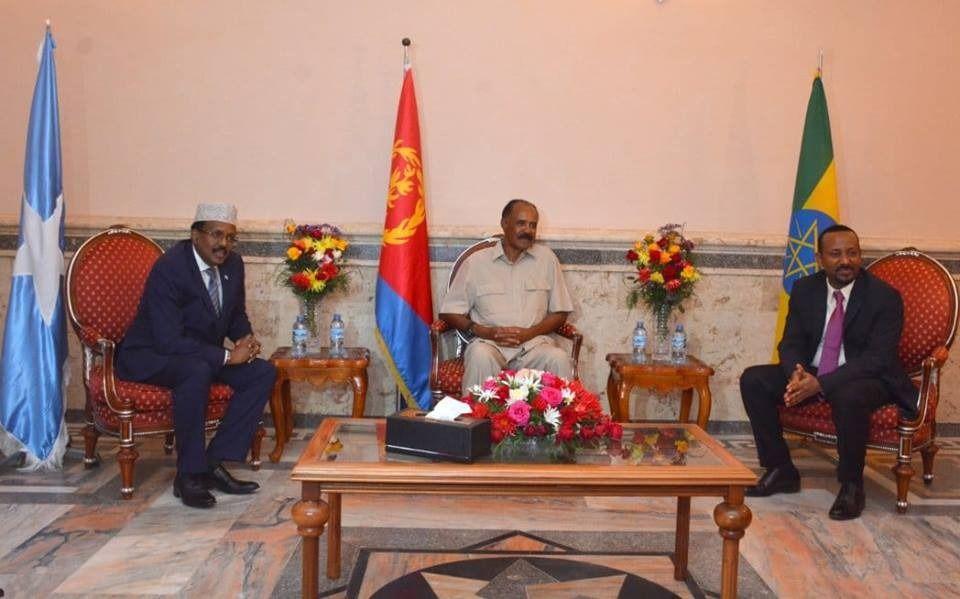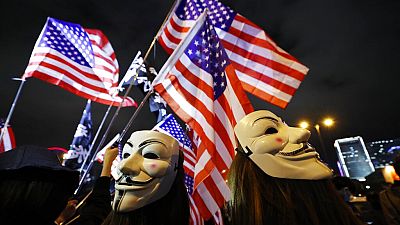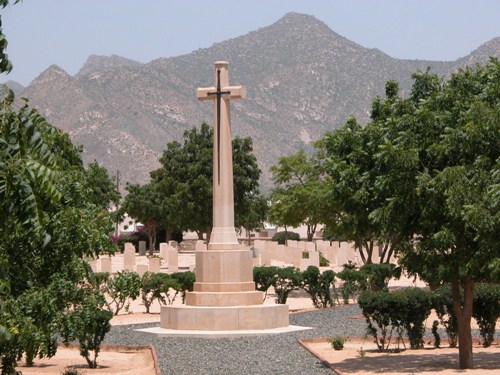The time is ripe for Egypt, Ethiopia and Sudan to set aside narrow national interests and address climate change by building flexibility into the forthcoming GERD treaty
Ethiopia, Sudan, and Egypt have laid the framework for resolving their disputes over the filling and operation of the Grand Ethiopian Renaissance Dam (GERD).Earlier in August 2019, Ethiopia rejected Egypt’s proposal on the filling and operation of the GERD. In a growing diplomatic spat, Egypt warned Ethiopia not to move forward with filling and operation, saying that it “will have negative consequences for the stability in the region.”
In November, the GERD negotiations reached another deadlock, and Egypt called for international interventions to overcome the impasse. The U.S. invited Ethiopia, Egypt, and Sudan to Washington, DC, and on November 6, delegates of the three countries met with the US Secretary of the Treasury and the World Bank president. They also agreed to resume talks that would be supported and attended by the U.S. and the World Bank as observers.
Since then, they have held four technical meetings in Africa and two more meetings in Washington DC. Last week, after three days of rigorous discussions in Washington DC, the countries issued a joint statement that laid the framework for the final agreement on the filling and operation of the GERD. The joint statement, which seems to have been followed by productive technical discussions nailing down some key details, underscores the need for an adaptive agreement, thus it is expected that the three countries will consider climate change while developing the final terms.
Climate change impact
Climate change is projected to have catastrophic impacts on the hydrological cycle. Water availability, quantity, and demand will be affected. Existing studies and climate change models commonly predict increases in average annual temperature in the Nile Basin, leading to greater water loss due to evaporation. There is much less certainty in projections concerning future rainfall, river flows, and water availability in the Nile Basin. Studies concerning the latter find contradictory results; one predicts floods and increased runoff, and the other predicts water scarcity and possible droughts.
It seems evident that proper governance of the filling and operation of the GERD in the face of these uncertainties demands a response to two contradictory scenarios: either an increase in water availability and flooding, or water scarcity and drought; each of which requires opposite adaptation strategies.
Building flexible and resilient legal and institutional arrangements in the forthcoming GERD treaty will no doubt be at the heart of such adaptation strategies. If climate change reduces the available water in the Nile Basin, competition for water between Ethiopia, Sudan and Egypt will intensify, possibly leading to conflict. If the available water resources increase due to climate change, this will create a need for new legal response to flooding. In either case, flexibility is crucial in adapting to climate change.
Accordingly, while developing the GERD treaty, Ethiopia, Sudan, and Egypt should use the following five mechanisms: (1) Drought provisions (2) flexible allocation strategies; (3) amendment and review procedures; (4) termination clauses; and (5) River Basin Organizations (RBOs).
Drought provisions
Drought provisions are the most common mechanism for enhancing treaty flexibility. Ethiopia, Sudan, and Egypt can allocate fixed quantities of waters and build flexibility into the GERD treaty by including special provisions that govern exceptional circumstances, like droughts.
The 1944 agreement between the U.S and Mexico on the Rio Grande and Colorado Rivers have provisions governing possible problems resulting from drought. The agreement allows Mexico to deliver less than the minimum quantity of water to the U.S during an “extraordinary drought” of up to five years. If deficiencies occur during this period, Mexico is to repay by increasing flows during the next five-year cycle. In the case of the Colorado River, the agreement guarantees that Mexico receives a certain annual quantity of the Colorado River’s water from the U.S. “In the event of extraordinary drought” though, the water allotted to Mexico is to “be reduced in the same proportion as consumptive uses in the United States are reduced.”
Grand Nile compromise—a Sisyphean task?
By Mahemud Tekuya
Both in the Rio Grande and Colorado Rivers, the upstream countries can deliver below the minimum quantity of the water during severe drought seasons and repay the water during the normal seasons. But, given Egypt’s dependency on the Nile, it is unreasonable to allow upstream Ethiopia to deliver below the minimum quantity of water during drought seasons.
Therefore, unlike these international experiences, Ethiopia seems set to promise to release 37 billion cubic meters (BCM) during the drought period, and more waters from its reservoir when the flow of the Nile is below 31 BCM. This approach is a fixed quantitative allocation strategy that does not offer the flexibility needed to address the anticipated impact of climate change. Therefore, it is must be supplemented in the treaty by clauses that provide sufficient opportunity to modify releases depending on changing hydrological circumstances.
Flexible water allocation
Instead of allocating the Nile waters based on the assumption of a fixed, and often too optimistic, perpetual water supply, or fixed volumetric allocation strategy, Ethiopia, Sudan, and Egypt should allocate the Nile water resources in accordance with the social, economic, or climatic changing conditions existing in the Nile Basin.
There are a couple of ways this can be achieved. According to a 2015 UNESCO paper titled ‘Transboundary water governance and climate change adaptation: international law, policy guidelines and best practice application’, a rather simple method is to include a provision that requires Ethiopia to deliver a minimum flow to Sudan and Egypt in order “to maintain human health and basic ecological functions.” The other, and perhaps the best option is to include a percentage allocation strategy in the draft and share the possible water deficiencies, and surplus, proportionally among the three countries. The latter option is advisable as it “allows flow regimes to respond to both wet and dry conditions,” the paper suggests.
Amendment and review
Ethiopia, Sudan, and Egypt can also build flexibility into the GERD treaty by including amendment and periodic review processes provisions. These provisions are very important as they give the three countries the ability to address unforeseen circumstances, while “resynchroniz[ing] national and basin-wide strategies with new knowledge and changing circumstance,” according to an article in the International Journal of Water Resources Development. They are crucial for the sustainability of the GERD treaty because, through time, the hydrological and climatic conditions on which the treaty is based will change significantly. This is particularly true in the era of climate change.
Based on the current hydrological and climatic conditions, Ethiopia promised to fill the GERD “during the wet season, generally from July to August and will continue in September.” The wet and dry seasons could change because of climate change. Thus, unless the final agreement incorporates this, Ethiopia will not have the flexibility to fill the dam if the wet season happens in months other than those stated in the agreement.
Several mechanisms can be used to amend the GERD treaty. In the Colorado River Basin, for instance, modifications of the 1944 Colorado Treaty are made through the “minutes” of meetings of the International Boundary and Water Commission (IBWC), a joint commission charged with the application of the Treaty and composed of an Engineer Commissioner from both parties (U.S. and Mexico,). The Mekong River Basin Agreement between Cambodia, Laos, Thailand, and Vietnam also allows the alteration of the Agreement through amendment proposals agreed to by all the parties.
Sink or swim: unlocking the Nile impasse
By Mahemud Tekuya
Ethiopia, Sudan, and Egypt may currently consider the 37 BCM drought threshold as equitable. However, with the anticipated impact of climate change, this threshold could very well be inequitable in the future. So, unless the agreement acknowledges this, the three countries’ ability to adapt to climate change will be seriously undermined.
Besides amendment, periodic review is also important to ensure equitability in the face of climate uncertainty. The GERD treaty needs to include explicit provisions concerning the adjustment and review of the agreement in general, and in particular, regarding the fairness of the filling and operation the GERD, High Aswan Dam (HAD), and Sudan’s reservoirs to adapt to the ramifications of climate change. Moreover, it should define what constitutes climate change and specify when adjustments would be necessary.
The latter can be done by setting down “triggers” (magnitude of climate change) that would activate treaty adjustments or by merely providing specific periods when the agreement should be reviewed. In the Syr Darya River Basin, for instance, Stephen McCaffrey writes that the Framework Agreement requires periodic review of Agreements “on water releases, production and transit of electricity, and compensations for energy losses” and calls for the conclusion of new Agreements annually. Another example is the Treaty between India and Nepal governing Mahakali River, which requires a review every ten years or “earlier as required by either party.”
Termination clauses
The fourth mechanism for enhancing treaty flexibility is to simply include a termination clause in the treaty allowing any riparian state to terminate it upon a given period of notice. In the Syr Darya Basin, for instance, the Framework Agreement restricts its validity to five years, allowing automatic renewal for another five years provided that no termination notice is submitted “six months in advance from any party.” In so doing, the Framework Agreement provides sufficient flexibility for parties adversely affected by changed circumstances, permitting them to withdraw from what could otherwise be an oppressive treaty.
It is, however, to be noted that a termination clause that has such an abbreviated period of notice would not always be appropriate for all types of treaties. As pointed out by professor and water laurate Stephen McCaffrey, it would best fit only treaties that do “not involve permanent structures but provide for allocations of water…” The coming GERD treaty involves permanent structures, dams, and reservoirs, and is therefore unsuitable for termination within a short period of time.
Although allowing either of the three countries to withdraw from the GERD treaty upon a one-year period of notice is important for treaty flexibility, it will be in strict contrast with the predictability and certainty required for the effective management of the Nile watercourse, especially where infrastructure is involved. The flexibility required for adapting to climate change and the certainty required for smooth operations of dams would be reconciled if a long period of notice, say 10-15 years, is required to withdraw from the treaty, while at the same time empowering the Nile Basin Commission (NBC) to review the equitable allocation of the Nile waters periodically.
River Basin Organizations
Sustainable transboundary water management is inextricably linked with River Basin Organizations. RBOs play a significant role in building flexibility into watercourse treaties. RBOs’ ability to adapt, amend, and extend the institutional arrangement between riparian states is at the center of developing greater resilience and adaptability to the changing environment.
Of the 260 transboundary river basins, about 119 of them have water institutions. While the roles and authorities of such institutions vary significantly, institutions capable of adapting to the challenges of climate change should “have a broad scope, include all riparian nations, and have management and enforcement authority,” according to Pacific Institute and UN Environment Programme research in 2009.
In relation to RBOs, Ethiopia, Sudan, and Egypt have two options. The first is to establish a joint body in the GERD treaty that will manage the operations of dams in their respective countries. The problem of this option is that other eight Nile Basin States are not part of the GERD negotiations, and thus will be excluded from the joint body. Other Nile Basin States are not integrated into the GERD treaty means that their actions as to the utilization of the Nile waters and climate change adaptation will be outside the joint body. This will impede effective adaptation.
The other, and arguably the best, option is to manage all dams, including the GERD, through the NBC, a joint body be envisaged in the Cooperative Framework Agreement (CFA). The CFA is a result of an attempt by riparian states to prepare a basin-wide framework to regulate the inter-state use and management of the Nile River. All the Nile basin states except Egypt and Sudan agreed to it.
The CFA gives the NBC a wide range of powers, which include the ability to examine and determine how water is best used in and distributed among the Nile Basin countries. The NBC has a broad scope, is entrusted with rule-making authority and involve all upstream countries. Egypt and Sudan should accede to the framework agreement. And the forthcoming treaty should empower this body to manage the filling and operation of the dams and reservoirs in the three countries.
For many years, Ethiopia, Sudan and Egypt have been trying to protect their narrow national interests. But now, with the ever-increasing threats of climate change, the time seems ripe to set aside such egoistic national interests, negotiate in good faith, and address the ramifications of climate change by building flexibility into the forthcoming GERD treaty.
Source=https://eritreahub.org/sharing-the-nile-flexibility-must-be-foremost-in-gerd-treaty
 Ethiopian Prime Minister Abiy Ahmed (R), Eritrean President Isaias Afwerki (C) and Somali President Mohamed Abdullahi Farmajo pose for a picture in Asmara, Eritrea on January 26, 2020./ PHOTO Courtesy: Abiy Ahmed – Twitter
Ethiopian Prime Minister Abiy Ahmed (R), Eritrean President Isaias Afwerki (C) and Somali President Mohamed Abdullahi Farmajo pose for a picture in Asmara, Eritrea on January 26, 2020./ PHOTO Courtesy: Abiy Ahmed – Twitter








 Detail of FAO Desert Locust Movements, Aug 2019 – Feb 2020
Detail of FAO Desert Locust Movements, Aug 2019 – Feb 2020

 Yesterday afternoon Kate Osamor MP was announced as the newly elected Chair of the APPG for Eritrea. Kate brings her experience as Shadow Secretary of State for International Development and as long time Chair of the APPG for Nigeria.
Yesterday afternoon Kate Osamor MP was announced as the newly elected Chair of the APPG for Eritrea. Kate brings her experience as Shadow Secretary of State for International Development and as long time Chair of the APPG for Nigeria.


 The EU Parliament’s Rapporteur to the Committee on Budgetary Control, Michele Rivasi has released
The EU Parliament’s Rapporteur to the Committee on Budgetary Control, Michele Rivasi has released 



















